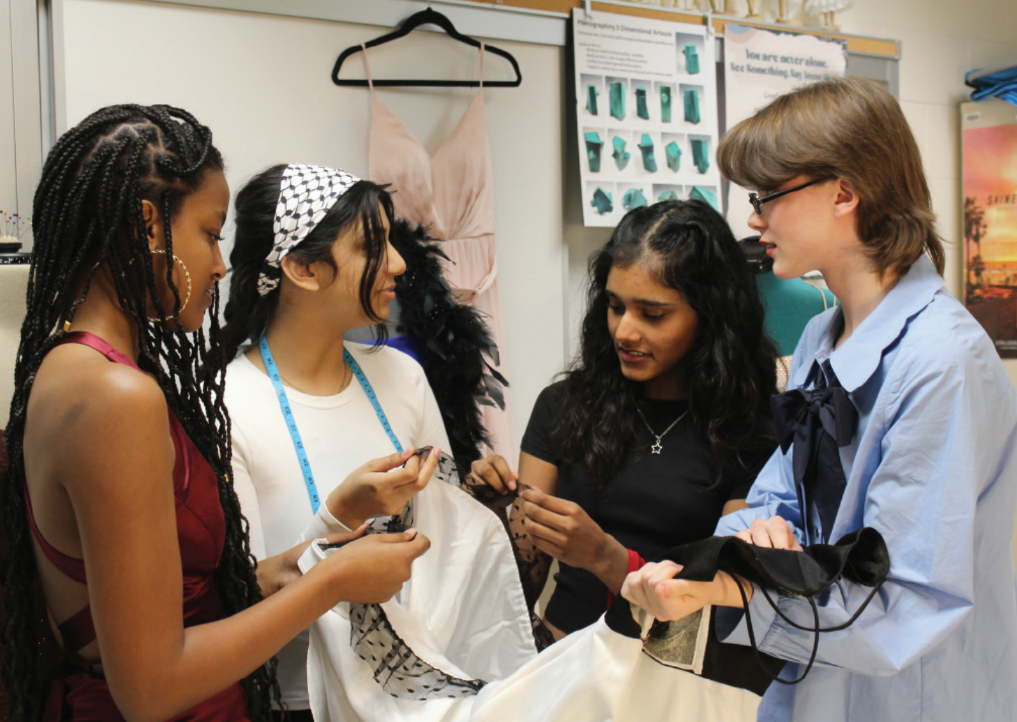Innovative Alterations: Fashion Club looks to break barriers
Aybika Kamil | The Chronicle
Stitching together dresses and real-world learning opportunities, Mason High School (MHS) Fashion Design teacher and Fashion Club advisor, Silvia Cattini, allows students to rent formal attire free of charge.
In classroom C303, Cattini has dresses displayed on mannequins, waiting to be rented by students, whether it be for Prom, Homecoming or any other formal event. The only requirement for students who rent dresses is to bring them back clean.

Fashion Club members Ethiopia Jegol, Ayesha Ahmad, Yuktha Arunprasad and Wyatt Adkins discuss dress alterations.
Raised in Milan, Italy, Cattini was not accustomed to the traditions in American high schools when she began teaching. When she was a student, her school did not have a Homecoming or a Prom. She said it was strictly academic and there were no parties hosted by the school or any sort of graduation ceremony.
“We dress according to the requirements of our environment which may not express the full nature of a person,” Cattini said. “I saw the importance of these special events and how everybody wants to feel like a princess or have a special night.”
Cattini was able to start her dress collection with support from other teachers and by shopping at thrift stores for formal clothing, practicing the value of sustainability she said she tries to instill in her students.
“I found enthusiasm from teachers and they started donating bridesmaid dresses that are just perfect for Prom,” Cattini said. “I would love [the process] to be more of a donation to involve the most people possible.”
Cattini said buying clothes for school dances or other events can also be difficult for many families considering the expensive cost of formal attire. Being unable to afford appropriate clothing, students may be subject to missing out on significant happenings such as Prom or Homecoming.
“It can be a burden for families because prices are really high for nice dresses and it penalizes those who cannot buy new clothes,” Cattini said. “I thought about doing something that was mindful about the economy of the family.”
Junior Ayesha Ahmad works as an Events Coordinator in the MHS Fashion Club along with other board members. The club is hoping to hold a Connect session on March 20 for more exposure, allowing students to have fittings for possible future rentals. Ahmad said that she hopes this project can help combat fast fashion.
“I think it not only gives students who don’t have the money to buy a really nice prom dress, but it’s also a good way to save the environment,” Ahmad said. “It’s really good that people can reuse dresses from before. It’s a more sustainable way of getting dresses.”
Within the Fashion Design curriculum, Cattini incorporates lessons about being environmentally conscious with clothing. She said that she has found that most students want a new dress for every occasion, and she sees the effects of waste and pollution.
“You’re going to be on this planet for so long, and the next generation even more,” Cattini said. “You don’t want to live with my garbage or your leftovers sitting in the closet and eventually ending up in a landfill ten years later. It is just heartbreaking for me to think about.”
Cattini said she wants to inspire a passion for environmental friendliness in others, and that this project is an example of her many ideas for implementing renewability with clothes.
“I would like to see it as a process that can grow and really excite people about being sustainable and make it personal,” Cattini said. “It’s special, even if it’s not new, because you make it special.”
Cattini has also used this project to give her students real-world practice. If a dress does not fit the way a renter wants it to, Cattini brings it to the attention of her students. She asks customers to pair with someone willing to do reversible alterations. By doing so, after the dress is used, it can be brought back to its original form and her students get first-hand experience as it happens.
“Since I teach Fashion Design, my perspective to be mindful about the environment is learning how to do alterations,” Cattini said. “Even temporary alteration is important for my students [to] learn.”
Cattini is looking to expand the array of clothing she has for more inclusivity. She hopes to include male and gender-neutral attire with a variety of sizes.
“My dream would be first to increase inventory,” Cattini said. “I hope more donations come that can cover everybody’s needs.”
Ahmad and other Fashion Club members are aiming to increase their catalog of dresses by planning more donation events and visiting thrift stores for second-hand clothing. They are currently looking into advertisement opportunities to raise awareness about the rental dress program.
“Having more donations is great,” Ahmad said. “We’ve been asking teachers and students to donate old dresses because once you have a Prom dress, where are you going to re-wear it? What are you going to do with it? It’s so much better to give it to someone else to wear than throwing it in your closet.”
Through her experience teaching at MHS, Cattini has seen the value of school events where students have an avenue to express themselves and bond with peers. She said that she hopes giving students the opportunity to rent outfits for such occasions continues to allow them to access these events.
“It’s good to enjoy and celebrate achievements,” Cattini said. “It’s about creating communities and connections.”
